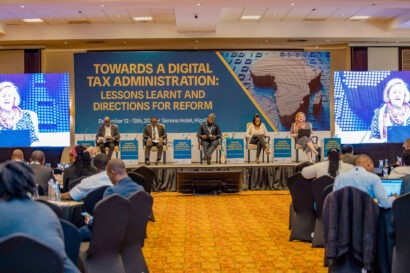What is the potential of digital finance, a cashless economy and system interoperability for strengthening tax administration in lower- and middle-income countries (LMICs)? Ludovic Bernad attended in February the Inclusive FinTech Forum (IFF) in Kigali, Rwanda, on behalf of the International Centre for Tax and Development (ICTD). The forum brought together financial technology leaders, policymakers, and development experts from across Africa and the world, providing invaluable insights into the rapidly evolving landscape of digital finance.
Reflecting on the vibrant discussions and announcements at the IFF, a few takeaways stood out for their potential to transform financial technology and inclusion in Africa, which in turn are expected to improve tax administration and revenue collection.
Cross-Border Financial Innovation
A key highlight was the announcement by the National Bank of Rwanda and the Bank of Ghana, in collaboration with the Global Finance and Technology Network (GFTN), of the launch of the framework for Africa’s Next-Gen Digital Payment Infrastructure (dubbed Project 54). The framework aims to eliminate the traditionally high costs and delays associated with cross-border transactions, with its initial implementation resulting in a platform that enables seamless, real-time payments between Rwanda and Ghana. Such innovation not only facilitates business and individual financial exchanges but also aligns significantly with the African Continental Free Trade Area’s (AfCFTA) aspirations for a unified African market.
Complementing this, Rwanda and Ghana introduced a fintech license passporting agreement to remove bureaucratic hurdles, thereby fostering fintech investment and innovation across both markets. The potential scalability of this initiative could set a crucial precedent for harmonised fintech regulation across Africa, further catalysing financial integration.
Enhancing SME Capabilities, Paving the Way for CBDCs, and the Rise of DPI
Another critical topic extensively discussed at the forum was enhancing support for Small and Medium-sized Enterprises (SMEs), which constitute over 80% of businesses across the continent. Experts highlighted digital financial solutions, such as blockchain-based payments and mobile banking, as essential tools for improving SMEs’ access to finance and markets, thus empowering their growth and boosting overall economic development.
Participants also agreed that the adoption of Central Bank Digital Currencies (CBDCs) is inevitable. A representative from the National Bank of Rwanda (BNR) underscored that the distributed ledger technology underpinning CBDCs could enable central banks to seamlessly reconcile transactions with commercial banks, significantly reducing current delays.
Lastly, reflecting Rwanda’s ambition to lead advancements in digital public infrastructure, Innocent Muhizi, CEO of the Rwanda Information Society Authority (RISA), announced Rwanda’s upcoming launch of a Digital Public Infrastructure (DPI) Centre of Excellence, established with support from the Gates Foundation.
Rwanda’s Digital Payment Interoperability Launch
The forum’s most consequential announcement from a taxation and research perspective was RSwitch‘s launch of the eKash Person-to-Merchant (P2M) payment platform. Introduced by RSwitch CEO Blaise Gasabira alongside Rwanda’s Minister of ICT and Innovation, Hon. Paula Ingabire, the eKash system represents a landmark in Rwanda’s financial digitalisation journey. By enabling customers to directly pay merchants from any bank account or mobile wallet without incurring transaction fees, eKash significantly lowers barriers to digital financial inclusion, thus boosting the convenience of digital payments and creating an extensive and detailed transactional dataset previously unavailable.
Rwanda’s Rapid Evolution in Digital Payments
It is essential to highlight the transformative power that Rwanda’s growth in digital payment infrastructure is having. Recent statistics presented in Rwanda’s 2024 FinScope Study indicate how, from just 30% adoption in 2020, digital financial services beyond remittances have surged to reach 73% of Rwandan adults in 2024, with mobile money services specifically utilised by 86% of adults. This rapid digital adoption has significantly driven financial inclusion, elevating formal access from 77% to 92% in just four years.
However, despite this growth, cash remains prevalent, with 92% of Rwandans still preferring cash transactions for routine expenses. Only a minority uses digital payments to buy goods and services. Challenges like high mobile transaction fees and limited digital salary payments further complicate the shift from cash to digital payments. Such patterns are well documented in previous and ongoing ICTD research.
Implications for Future Tax Research
The advancements discussed at the Inclusive FinTech Forum offer profound implications for taxation research. Rwanda’s strides in digital payments provide a fertile ground for deeper exploration into how digitalisation affects tax compliance, taxpayer behaviour, and overall fiscal policy effectiveness. Moreover, the introduction of harmonised digital payment platforms such as eKash’s P2M significantly reduces fragmentation in payment systems, promising comprehensive insights into economic activities previously obscured by a lack of digital interoperability.
In fact, the launch of eKash’s P2M platform indirectly supports ICTD’s ongoing research on digital merchant payments and their impact on tax compliance. Previously, our research has focused on the uptake of MoMo merchant payments and its influence on tax compliance behaviour in Rwanda. With eKash enabling interoperability and integrating diverse payment sources beyond the MoMo ecosystem, digital merchant payments become more accessible and appealing to a broader user base. This interconnected ecosystem creates a more conducive environment for ICTD to conduct expanded research, providing opportunities to gain deeper insights into taxpayer behaviour, compliance patterns, and broader fiscal implications.
Attending the Inclusive FinTech Forum reaffirms our thought that Africa stands at a critical juncture regarding digital financial innovation. For ICTD, these developments promise a unique opportunity to expand our understanding of digital payments and taxation dynamics. ICTD research aims at describing digital payments adoption barriers, the effectiveness of fiscal incentives for adoption, issues with sharing of digital payments data and the capacity of tax administration to put this new data, if shared, to its best use. This work would ultimately contribute to understanding the potential of cashless payments for stronger tax systems across the continent.



